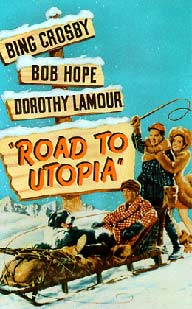|
LITR 5439 Literary & Historical Utopias |
|
Kristine Vermillion
WEB HIGHLIGHTS:
A Collective of Individuals
The utopian collective identity versus the myriad of
individual identities of its members is a subject of particular importance, and
Sarah Coronado does a good job investigating the psychological realities of this
utopian convention that deals with the general names and/or the renaming of its
participants in her research post titled “A Look at the Members:
Collective and/or Individual Identities.”
We have mentioned in class the unmemorable names of the women in
Herland and the generic names of the
citizens in Anthem. Coronado’s
research into how cults work to suppress individual identities in order to
instill the new collective identity through psychological manipulation is very
interesting, and the application of it to our study is engaging.
This renaming process made me think of Louis Althusser’s “Ideological
State Apparatuses.” In many ways the
utopian community, like a cult, operates as an ISA, and “Ideology Interpellates
Individuals as Subjects.” Regardless of the ISA a person is involved in,
Althusser reasons that the way individuals are interpellated—a term he used to
identify the actual calling out and naming process—determines what type of
subjects they will be. A good example of this from our reading is when
Prometheus renames Liberty 5-3000 the Golden One and then Gaea. Her original
name was one that was non-descript and general. The name determined the
subject’s status in the society, which was that of a general cog in the social
wheel. Her interim name identified her as a beautiful individual. Her final
name, given within the parameters of Prometheus’ new ISA, determined the kind of
subject she would ultimately be, i.e. a mother.
Only when the problem of the individual is dealt with can the true idea of
“human progression” that is at the heart of the utopian genre be realized.
Healthy individuals make healthy societies.
This idea is at the heart of Sarah Coronado’s Midterm titled “Human
Progression in Utopian and Dystopian Literature.”
In it she points out that, for example,
Anthem is a dystopia for precisely
this reason. In the destruction of the word “I” to make a utopian society, they
castrated and made their community static and lifeless. How they named, i.e.
interpellated, their people determined what type of subjects they would be. This
utopia failed to account for the fact that a society is made up of individual
parts, and when the individual parts are sniffed out by the idea of the “greater
good” there is only regression on every front. This is why Equality 7-2521 has
to be renamed. On the other hand, in
Looking Backward, Coronado points out, via the example of Julian West, that
when there’s a conversion story and the character can go through the motions and
intelligently deduce that the “greater good” is in his best interests and that
it actually serves to meet the individual needs in a way that helps all, the
prerequisite need of the individual is met. The beauty of the story of
Herland is that it shows that the
travelers truly have a choice to make between various societies, therefore
maintaining the idea of freedom. Terry is free to leave, Jeff was allowed to
stay and Van was able to take Ellador with him.
The question of identity and the relationship between the individual and the
collective brings us straight into the heart of religion and philosophy. Once
again this leads me to thinking about the power of literature and its function
in culture and society. These utopian literary pieces deal with fundamental
questions of individual worth and how to order society, and the application of
ideas through literature seems to wield great amounts of power. Coronado
discussed this idea of the power of literature and language. Her first
observation dealt with Anthem and the
source of the power within that dystopia: the power of language. The
philosophy/religion of the land was regulated via words. They erased the
language of the individual and replaced it with the language of the social. This
is why Rand’s work is important.
She uses a story to create a speculative fiction to show where this idea might
ultimately lead. It is also quite relevant to the study of literature and
literary theory because this idea is at the forefront of most of the
philosophical inquiry that the university is steeped in. We explore in theory
the semiotics of language and man’s use of it, and the post modern move has been
toward destroying individual identity, creativity and authorship and replacing
it with different types of social hypotheses. While their work might not be
nefarious in its intent, Rand imagines where this tendency might ultimately
lead. It is obvious she doesn’t think highly of it.
The second point of power Coronado discussed is the power of the utopian
narratives to take the reader on a conversion experience along with the fellow
traveler in the fiction. “The
conversion conflict also brings us in as readers, because unconsciously, we
attempt to be converted as well. It
is hard to shake our political ideas and beliefs and when we read these
alternative societies, we cannot help but take part in something similar to a
political debate.” The mere
exercise of reading a utopian fiction warrants individual inquiry into social
forms and potential modifications and variations. For this reason alone, in my
opinion, it is a particularly powerful genre, especially if it helps steer us
away from making dystopias but rather helps us to build better societies, and
this is ultimately a process deeply involved in the interpellation and
development of individuals within the collective.


